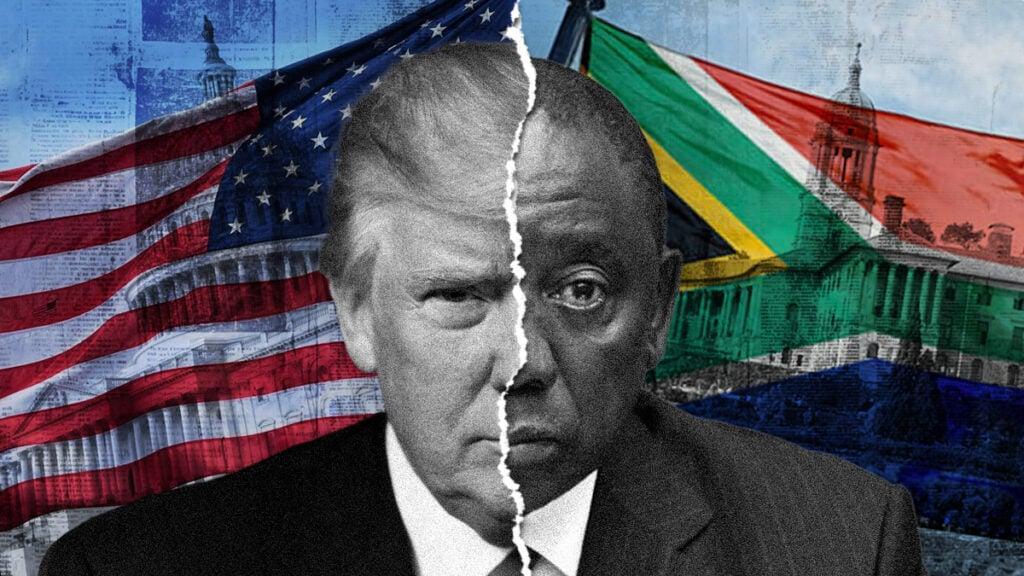Africa-Press – South-Africa. A bill introduced in the United States Congress to review relations with South Africa and sanction some politicians is extremely unlikely to become law, according to legislative data, past trends, and expert analysis.
The bill, known as the US-South Africa Bilateral Relations Review Act of 2025 (H.R.2633), calls for a comprehensive review of the relationship between the US and South Africa.
It also seeks to identify South African government officials and ANC leaders eligible for sanctions.
Despite its geopolitical aims, the bill faces steep legislative hurdles. According to projections by GovTrack.us, H.R.2633 has a 7% chance of passing the committee and only a 1% chance of being enacted into law.
GovTrack.us, a nonpartisan website tracking congressional activity, uses statistical models based on historical data to estimate a bill’s prospects.
Honorary Professor of International Relations at Wits University and former deputy director for policy planning in the office of the US Secretary of State, Professor John Stremlau, agrees with these low odds.
He told BusinessTech he believes the bill is a “nonstarter in the house itself,” citing, among other things, the lack of activity since its introduction.
Stremlau noted that House Speaker Mike Johnson is “preoccupied with budget issues” and has not prioritised similar legislation in the past.
Even if the bill passed the House, he added, there is “no prospect for the Senate to pass this bill which would be filibustered by the Democrats,” calling the effort a “dead in the water undertaking.”
Republican Representative Ronny Jackson, who introduced the bill
Big hurdles
H.R.2633 was introduced on April 3, 2025, by Republican Representative Ronny Jackson (R-TX) and co-sponsored by Representative John James (R-MI).
Broadly, it seeks a review of United States-South Africa relations and sanctions “on corrupt South African officials.”
Jackson criticised South Africa’s “ties with China, Russia, Iran, and Hamas” as requiring consequences, saying the bill supports President Trump’s foreign policy.
But to become law, the bill must pass both chambers of Congress in identical form and be signed by the president.
The absence of a Senate companion bill further dims its prospects, as parallel legislation in both chambers usually signals greater momentum.
While some lawmakers have expressed concern over South Africa’s foreign policy, punitive measures have historically faced resistance due to diplomatic and economic factors.
A similar bill, H.R.7256, passed the House in the previous Congress but failed in the Senate, highlighting a lack of broad, bipartisan support.
Currently, H.R.2633 has been referred to the House Committee on Foreign Affairs and the Committee on the Judiciary.
As of early May 2025, no hearings, markups, or votes have been scheduled, and no Senate companion bill has been introduced. Without further legislative action, the bill’s path forward appears limited.
This does not imply that Trump is unable to take further actions against South Africa and its government officials, as evidenced by recent executive orders and Cabinet decisions.
US President Donald Trump
Strained relationship
The US, historically a key ally of South Africa with bilateral trade reaching R377.33 billion in 2024, has seen relations deteriorate sharply since President Donald Trump took office in January.
State Department spokesperson Tammy Bruce outlined the administration’s concerns, including what she described as “the unjust land expropriation law,” “discrimination of ethnic minorities,” South Africa’s ties with adversaries like Russia and Iran, and its case against Israel at the International Court of Justice.
Secretary of State Marco Rubio skipped a G20 meeting hosted by South Africa, stating, “My job is to advance America’s national interests, not waste taxpayer money or coddle anti-Americanism.”
The US has since cut billions in aid, including nearly 20% of HIV/AIDS prevention and treatment programmes in South Africa.
It has offered expedited refugee status to “disfavoured ethnic-Afrikaner minorities,” and Brice said they have launched “a serious review” of its entire South Africa policy.
On 11 May, a group of 49 Afrikaners departed OR Tambo for the United States on a private charter plane, having been offered refugee status to the country.
South Africa’s participation in the African Growth and Opportunity Act (AGOA), which allows duty-free access to US markets for some exports, is also under threat.
Trump also imposed 30% tariffs (temporarily reprieved) on South African goods, prompting the South African Presidency to warn that “unilaterally imposed and punitive tariffs are a concern and serve as a barrier to trade and shared prosperity.”
Relations were further strained by the expulsion of South Africa’s ambassador to Washington, Ebrahim Rasool, for criticising Trump.
Stremlau, who believes that these actions are influenced by advisors rather than “rational policy,” links the proposed sanctions bill to “an ignorant view of South Africa that was reflected in the executive order.”
He argues there’s “no rational explanation” for “a big push… to take quite a hard line.”
In response, South African President Cyril Ramaphosa said that he “expressed concern” over a “mischaracterisation of the situation… and our foreign policy positions.”
“We will continue to engage with the US and other stakeholders to correct this mischaracterisation and to restore the ties between our two countries.”
South Africa’s international relations department recently said that “the resettlement of South Africans to the United States under the guise of being ‘refugees’ is entirely politically motivated… to question South Africa’s constitutional democracy.”
“A country which has, in fact, suffered true persecution under Apartheid rule and has worked tirelessly to prevent such levels of discrimination from ever occurring again.”
Recently, Trump spoke with Ramaphosa on the phone about his meeting with Ukrainian President Volodymyr Zelenskyy and other issues. The South African President said the have two agreed to meet.
Source: businesstech
For More News And Analysis About South-Africa Follow Africa-Press






